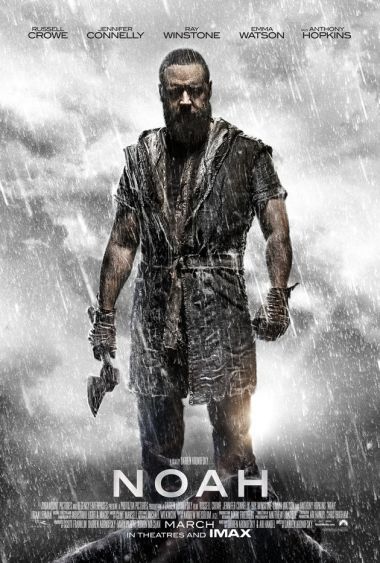Noah: floating life's big questions

One of the most contentious films to hit the silver screens in recent months, Noah, is set to take the UK by storm when it opens on Friday.
Directed by Darren Aronofsky, who is renowned for his somewhat dark and twisted style – think Black Swan and The Fountain – the two-hour feature film is based loosely on the biblical account found in Genesis.
Loosely is the appropriate term, given some additions to the cast (including several giant rock monsters – supposedly fallen angels – reminiscent of something from Transformers) and a lot of extra details not shared by the Scriptural account. But since Genesis offers only a one page summary of the story, it's hardly surprising that Aronofsky has added his own flair.
It's a gripping tale, which will surprise those who are expecting a gentle take on what is widely regarded as a children's story. Noah's survivor's guilt, huge family drama, and a fair amount of blood and gore strip away any "and the animals went in two by two" Sunday School memories, leaving only questions about the sanctity of human life, our role as protectors of the earth's resources, and our place in God's plan of redemption.
The movie centres on key biblical themes, while the portrayal of man's sinfulness is real and raw. We see humans as destructive, having ravaged the Earth's resources for their own gain and treated one another with absolute depravity.
Issues that we are still contending with thousands of years later – slavery, human trafficking and environmental devastation – are also brought to light.
In his titular role, Russell Crowe asserts that "Fire consumes all, but water cleanses. The Creator destroys all, but only to start again."
And Aronofsky does not shy away from the idea of God's judgement and wrath on humankind, while also offering hope. Those who fear that the movie does not line up with the narrative of the Bible need not worry, despite a reliance on a few somewhat bizarre 'miracles' to tie the story together, key questions are raised, addressed, and left for the audience to ponder long after the credits role.
Matt Adcock, of the London School of Theology, believes that regardless of our individual take on the film, it will be instrumental in opening up conversations about the Bible and central biblical themes.
"I felt that they kind of 'got it' – they haven't just read two pages of the Noah account, but there's plenty to chew over from a theological standpoint throughout the film," he explains.
"Those big themes like redemption and the fallenness of man, it's great to see those on the big screen for hundreds of thousands of people to go and see.
"It has to be about beginning dialogue. I believe you should go and see and enjoy it, or not, and then go and talk about it in the pub afterwards, It should be treated like any other film in that way.
"I get a bit frustrated when people start to jump on the big Christian bandwagon, saying 'we can use this because it's sourced from the Bible'. There's a lot of filmmakers out there making great films with similar themes, they're just not called Noah. And I think that it sits alongside those rather than being in a special category of its own, which is a good thing."
Tom Price of the Oxford Centre for Christian Apologetics agrees, labelling Noah "a profound film".
"I think this is a good example of film doing what film does best - raising the big questions of life. What are we as human beings? Has there been a divine communication to us? Is God there or is he a figment of human imagination? And what about human nature; are we basically good, or is there something rotten and wicked in us? Is what's wrong with the world out there in other people – in serial killers, murderers and rapists – or is there something in us as well?
"There were clear links and clear points of contact with the biblical story [in the movie], but that's to miss the point of the art. The art is all about finding a connection with the questions that we're all asking," he contends.
Price argues that the film holds value for people of all walks of life, regardless of their beliefs.
"The questions that this film raises about human identity, stewardship of natural resources, God's existence, the nature of humanity, whether we can have hope, what we have hope in, are deeply human questions that concern not only those of us in the religious community but those outside of it too," he explains.
"I think the danger of this is that if we expect this to be a Christian film, true to Christian principles for a Christian audience then we don't create a space for film studios to do their art, and then we miss out on a really important conversation or connection."
And as for those rock monsters? "I don't see that as blasphemous," laughs Adcock. "I see it as creative and enjoyable; it's engaging."
Noah opens in cinemas across the UK on 4 April.
Damaris Trust is offering free official community resources at www.damaris.org/noah











